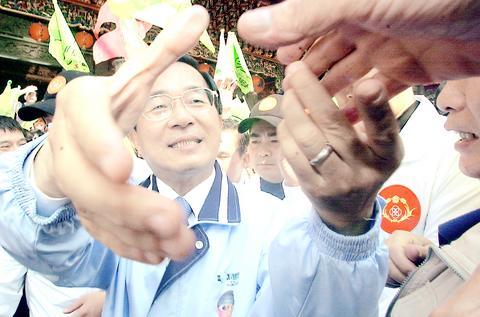President Chen Shui-bian (
"It is an act of selfishness that Lien Chan said he would not pick up his referendum ballots yet at the same time asks others to vote for him [in the presidential election]," Chen said.
During Saturday's election debate, Lien, representing the KMT-People First Party (PFP) alliance in the presidential race, said that while he respected others' decision on whether to cast ballots, he would not be voting in the March 20 referendum, calling it illegal.

PHOTO: LUO PEI-TEH, TAIPEI TIMES
"What is an illegal referendum? Who has the right to call it an illegal referendum?" Chen asked. "Whether a referendum is legal should be left for the grand justices to decide."
"You [Lien] cannot claim yourself a judge and declare that something is illegal," Chen said.
Chen said the people of Taiwan should support the March 20 referendum in order to score a victory for the country.
"It would be a victory for China's Communist Party if the referendum fails," he said.
Chen also criticized the system endorsed by the KMT-PFP alliance of granting 18 percent interest rates to retired military personnel, civil servants and teachers.
"Why does Lien favor the 18 percent interest rate? Because he, as a former vice president, is the recipient of an 18 percent interest rate," Chen said at a meeting with labor union supporters in Taipei yesterday.
"[With the preferential rate] Lien gets a monthly income of approximately NT$400,000, which is more than [the monthly income] of Vice President Annette Lu (呂秀蓮)," Chen said.
Meanwhile, Lien, branding Chen as capricious, said yesterday that more rounds of debate would be like "a bad drama that just doesn't know when to end."
At the end of Saturday's debate, Chen invited Lien to participate in another two debates. Lien then shied away from giving a definite answer.
Citing a poll that said 54 percent of respondents thought there was no need to have further debate, Lien said, "It is hard to focus on issues while debating with Chen because Chen is so inconsistent. I don't see the need to carry on a bad drama."
While the pan-blue camp's big boss declined more debate with Chen, Lien's campaign aides said yesterday that they would visit the Democratic Progressive Party (DPP) today and request a debate between the two camps' youth departments on enlistment.
During Saturday's debate, Lien proposed that young people perform only three months of national service and that the country abandon conscription.
Chen, pointing out that Lien's son has not done his military service, said conscription cannot be scrapped just because certain individuals do not want to do their military service.
Meanwhile, polls showed Chen and Lien were still neck and neck after Saturday's debate.
A poll conducted by the Chinese-language China Times indicated that 37 percent of viewers felt that Chen was more eloquent and quick-witted than his opponent, who received an approval rate of 28 percent.
A survey by the United Daily News suggested that 39 percent of viewers favored Lien's performance, while 38 percent thought Chen was a better debater.

AIR SUPPORT: The Ministry of National Defense thanked the US for the delivery, adding that it was an indicator of the White House’s commitment to the Taiwan Relations Act Deputy Minister of National Defense Po Horng-huei (柏鴻輝) and Representative to the US Alexander Yui on Friday attended a delivery ceremony for the first of Taiwan’s long-awaited 66 F-16C/D Block 70 jets at a Lockheed Martin Corp factory in Greenville, South Carolina. “We are so proud to be the global home of the F-16 and to support Taiwan’s air defense capabilities,” US Representative William Timmons wrote on X, alongside a photograph of Taiwanese and US officials at the event. The F-16C/D Block 70 jets Taiwan ordered have the same capabilities as aircraft that had been upgraded to F-16Vs. The batch of Lockheed Martin

GRIDLOCK: The National Fire Agency’s Special Search and Rescue team is on standby to travel to the countries to help out with the rescue effort A powerful earthquake rocked Myanmar and neighboring Thailand yesterday, killing at least three people in Bangkok and burying dozens when a high-rise building under construction collapsed. Footage shared on social media from Myanmar’s second-largest city showed widespread destruction, raising fears that many were trapped under the rubble or killed. The magnitude 7.7 earthquake, with an epicenter near Mandalay in Myanmar, struck at midday and was followed by a strong magnitude 6.4 aftershock. The extent of death, injury and destruction — especially in Myanmar, which is embroiled in a civil war and where information is tightly controlled at the best of times —

China's military today said it began joint army, navy and rocket force exercises around Taiwan to "serve as a stern warning and powerful deterrent against Taiwanese independence," calling President William Lai (賴清德) a "parasite." The exercises come after Lai called Beijing a "foreign hostile force" last month. More than 10 Chinese military ships approached close to Taiwan's 24 nautical mile (44.4km) contiguous zone this morning and Taiwan sent its own warships to respond, two senior Taiwanese officials said. Taiwan has not yet detected any live fire by the Chinese military so far, one of the officials said. The drills took place after US Secretary

THUGGISH BEHAVIOR: Encouraging people to report independence supporters is another intimidation tactic that threatens cross-strait peace, the state department said China setting up an online system for reporting “Taiwanese independence” advocates is an “irresponsible and reprehensible” act, a US government spokesperson said on Friday. “China’s call for private individuals to report on alleged ‘persecution or suppression’ by supposed ‘Taiwan independence henchmen and accomplices’ is irresponsible and reprehensible,” an unnamed US Department of State spokesperson told the Central News Agency in an e-mail. The move is part of Beijing’s “intimidation campaign” against Taiwan and its supporters, and is “threatening free speech around the world, destabilizing the Indo-Pacific region, and deliberately eroding the cross-strait status quo,” the spokesperson said. The Chinese Communist Party’s “threats